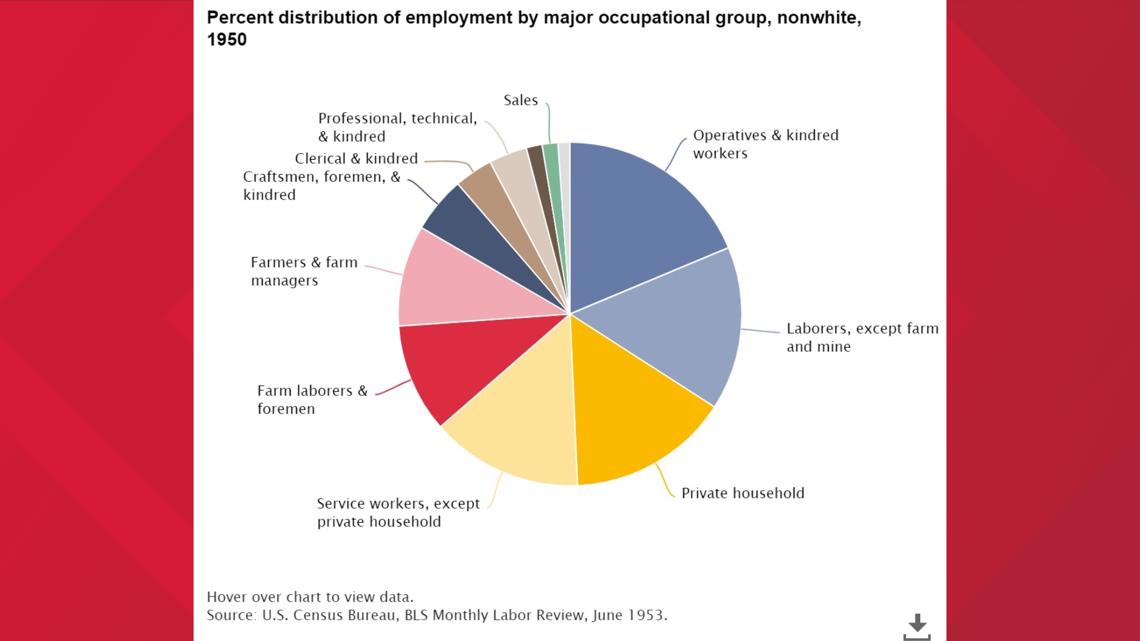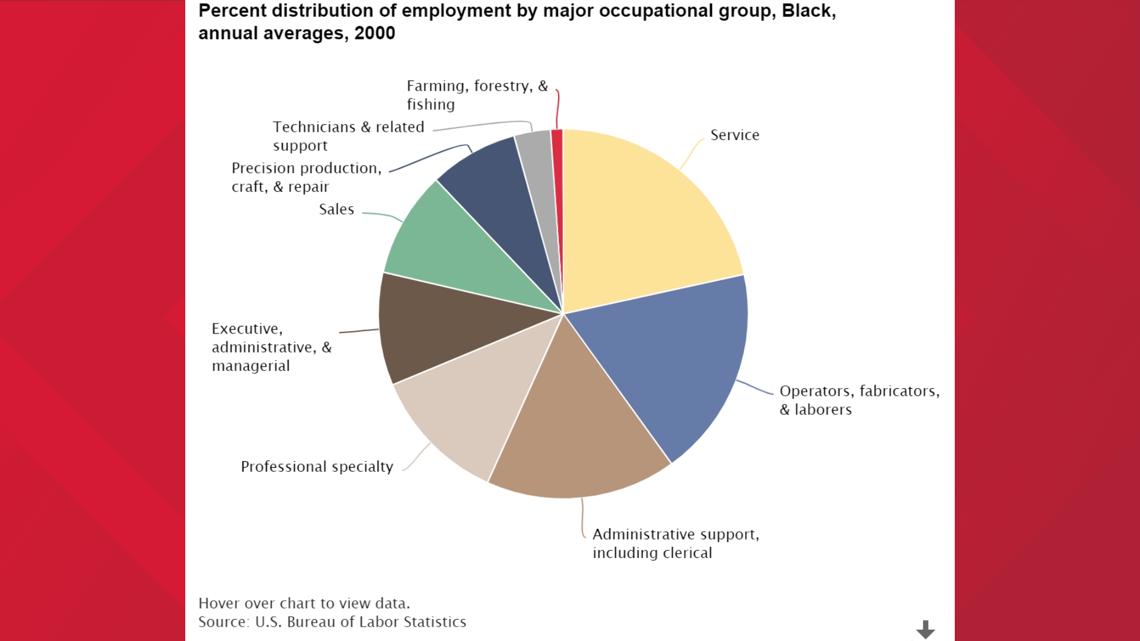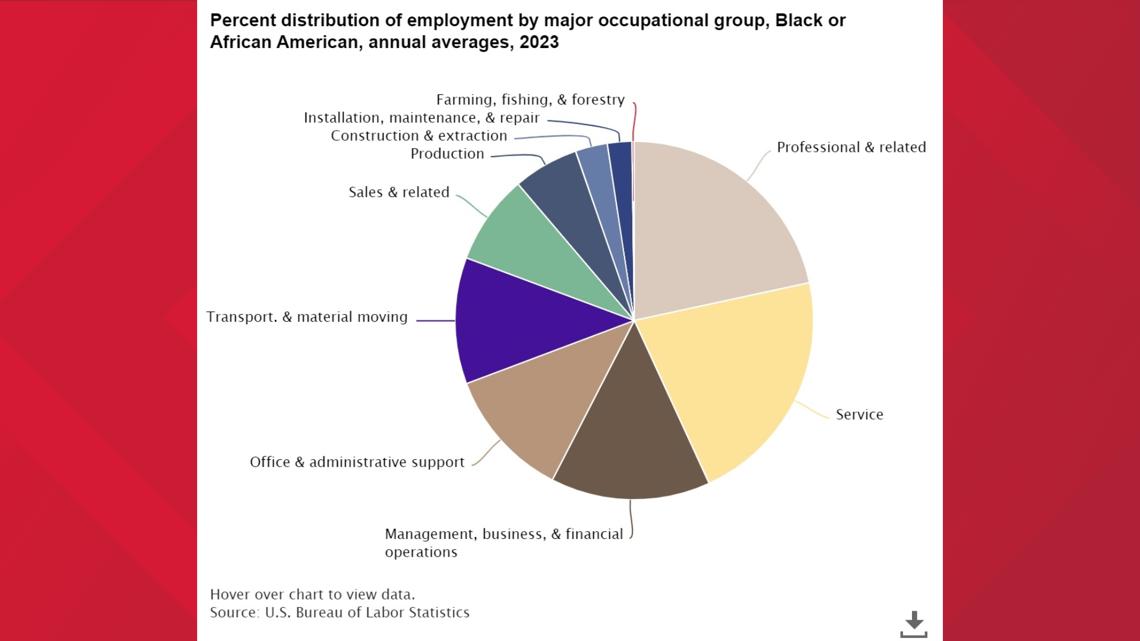ST. LOUIS — The phrase "Black jobs" was born during a debate in June between President Joe Biden and former President Donald Trump.
"They're taking Black jobs," Trump said about people who illegally entered the country.
Social media users gave the term a pulse. They asked, "What are Black jobs?" The responses to their questions were not just jobs but careers. Many people were proud to share what they do for a living.
Social media users reclaimed the phrase and decided that it would mean whatever Black people choose to do.
Olympian Simone Biles took to social media to add to the conversation. She responded to a post on X, the platform formerly known as Twitter, praising her for her "Black job" as an Olympic gold medalist. She reshared the post on Friday with the caption, "I love my black job."
Biles is not the only one making history. Hundreds of Black people shared on social media occupations such as CEO, lawyer, architect, doctor, etc., but it was not always that way.
Throughout history, slavery and exclusionary policies like Jim Crow and redlining would prevent people from getting certain types of work, not people coming into this country from the border.


In 1950, only 5% of Black people in America worked as professional, technical, and kindred workers or managers, officials, and proprietors (not including on farms), according to the U.S. Bureau of Labor Statistics. Fast forward to 2000, and the data shows that 20% of Black workers were working in those same fields.
The data shows a drastic change in the kind of work Black people do and have done over the years.


The St. Louis native Charli Cooksey's "Black job" is the founder and CEO of WEPOWER. The organization enables entrepreneurs in the Black and Latinx communities so they can have thriving businesses. WEPOWER also helps change policies and laws that benefit everyday people.
One of WEPOWER's four theories of change is wealth building. The organization works to increase the percentage of Black and Latinx households with living wages, guaranteed income, and job guarantees which will inevitably build wealth.
"The concept that there is such a thing as Black jobs is alarming and it's actually not too far off given our country's history of racism, biases that have led Black folks, Brown folks to be subjected to low wage jobs, jobs with less benefits so even though it was concerning that a former president said that I do think our policies reflect that our economy has not fully recognized the value and role that Black people play in shaping this economy," Cooksey said.
She also sees the phrase as an opportunity for greater access. However, she believes that to eliminate the myth, high-wage and high-quality jobs need to be available to everyone.
Cooksey burst into laughter watching the trend as she scrolled on social media.
"Black folks have always done an excellent job at taking lemons and making lemonade. And finding humor and joy in the most insane situations such as this made-up term Black jobs," Cooksey said, chuckling.
In 2023, the U.S. Bureau of Labor Statistics shows that the highest employment categories for Black people include professional and related, service, management, business, and financial operations.
So Cooksey urges people to do their economic research because times are changing.
Cooksey believes that reclaiming what the phrase means reflects ingenuity, creativity, and the ability to navigate the current reality. She also knows there is still work to be done, and it starts with our leaders.


Work to be done
The workforce Cooksey desires to help most is early childhood education.
She said that 90% of the people who work in early childcare are women and about 40% of the women are Women of Color. Cooksey called them overworked and underpaid.
"I think our leaders see essential work as the work of Black people yet we don't provide the benefits, the wages, the level of investment into these industries that we all rely on," she said. "If we were to shut down the childcare sector that would have a ripple effect on everyone and our economy would be in more crisis because women can't go to work."
The average hourly wage for childcare in Missouri is $13.80 which is $28,710 annually, according to the Council For A Strong America. Yet kindergarten teachers make $56,100 annually in Missouri, and preschool teachers in Missouri make $37,580 a year and even animal caretakers make $32,160.
Cooksey is passionate about the need to compensate a necessary workforce.
"We know there are high-wage industries that are on the rise that if we put some significant resources into it we can really see growth in the Black middle class," she said.
Cooksey referenced construction workers as an example. This high-wage industry enables people to live a quality life even without a bachelor's degree.
WEPPOWER is launching an accelerated business program for Black and Latinx construction company owners. Cooksey shared that ten companies will be announced at WEPOWER's garden party on August 16. The accelerator program begins in September.
Cooksey said the organization will help them build capital and a workforce that will create more Black jobs.



